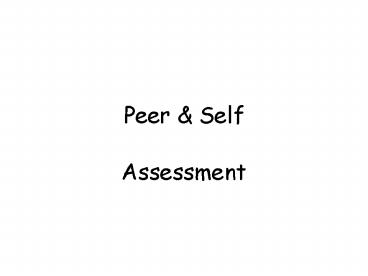Peer - PowerPoint PPT Presentation
1 / 12
Title:
Peer
Description:
Peer and self assessment helps students develop the ability the ability to make ... Provide opportunity for rehearsal in stress free contexts. Suggested reading: ... – PowerPoint PPT presentation
Number of Views:17
Avg rating:3.0/5.0
Title: Peer
1
Peer Self
- Assessment
2
Peer Self assessment
Students can perform a variety of assessment
tasks in ways which both save the tutors time
and bring educational benefits, especially the
development of their own judgement skills (Rust
(2001 p 10)
3
Peer Self assessment
Peer and self assessment helps students develop
the ability the ability to make judgements, a
necessary skill for study and professional
life Brown, Rust Gibbs (1994)
4
Advantages
- Student learning is engaged and active
- Sense of student ownership
- Development of the Autonomous learner
- Assessment becomes part of the learning mistakes
are opportunities rather than failures - Encourages deep learning
- Encourages individual personal development
5
(Self and Peer assessment) Promote lifelong
learning, by helping students to evaluate their
own and their peers achievements realistically,
not just encouraging them always to rely on
(tutor) evaluation from on high (Brown, 1996)
6
- Disadvantages/Problems
- Validity/reliability
- Unclear criteria used as measure not SMART
- Relationship issues may cloud assessment
- Lack of preparation
- Being judgemental not constructive
7
- Research supporting the role of Self Peer
assessment - Black I. Williams D. (1998) Assessment and
Classroom Learning - Inside the Black Box http//www.pdkintl.org/kapp
an/kbla9810.htm
8
- Strategies for student involvement in assessment
- When the task is set
- Choosing assessment tasks
- Setting assessment tasks
- Discussing assessment criteria
- Setting assessment criteria
9
- Involving students in assessment
- Strategies after the task is completed
- Making self-assessment comments
- Making peer assessment feedback comments
- Suggesting self-assessed grades
- Negotiating self-assessed grades
- Assigning self-assessed grades
- Assigning peer-assessment grades
10
- Strategies for feedback
- Avoid grading
- Increase use of self/peer assessment
- Medals and Missions
- Focus feedback
- Positive comments against tasks set
- Target setting )individual)
- Constructive criticism on learning opportunities
- Praise sandwich
- Increase role of formative assessment methods
11
- Suggestions for implementing self/peer
assessment - Brief students and tutors on expectations
- Explain and justify purpose and benefits of
strategies - Be explicit in criteria to be used as assessment
measurements - When students assess and evaluate work they
provide appropriate and sufficient evidence based
upon agreed criteria - Provide opportunity for rehearsal in stress free
contexts
12
- Suggested reading
- Biggs, J. (1999) Teaching for quality Learning at
University, Buckingham OUP - Black, I. William D. (1998) Assessment
Classroom Learning in Journal, Assessment in
Education - Boud, D (1995) Enhancing Learning through Self
Assessment, London Kogan Page - Brown, S.., Race, P. Rust, C. (1995) Using and
experiencing assessment, pp 75 86 in Knight, P.
(ed) Assessment for Learning in Higher Education,
London Kogan Page - www.geoffpetty.com































